

Annual Report 2023
© United Nations Children’s Fund Nigeria Abuja, April 2024










Annual Report 2023
© United Nations Children’s Fund Nigeria Abuja, April 2024







As we reflect on the progress and challenges of 2023, I am grateful to share insights from the United Nations Children’s Fund (UNICEF) Nigeria’s journey towards improving children’s lives in one of the most dynamic countries globally. Nigeria, poised to become the third most populous nation by 2050, faces immense challenges – particularly in ensuring the well-being of its vast young population. More than half of the children aged 0–17 years live in multidimensional poverty, especially in rural and conflict-affected regions.
Our collaboration with the Nigerian government and various partners has been instrumental in achieving significant milestones for children. We are thankful for the government’s support and commitment to enhancing children’s rights and welfare. This partnership is crucial as we implement our shared goals under the Country Programme 2023–2027.
Significant strides have been made in health care, with millions of children treated for severe illnesses and malnutrition, and substantial advancements made in vaccination and birth registration. In education, initiatives like the Nigeria Learning Passport have markedly increased access to learning, benefiting hundreds of thousands of children across the country. Our water, sanitation and hygiene (WASH) programmes have also seen considerable success, providing millions with access to clean water and sanitation.
None of these achievements could have been possible without the generous support of our donor partners. Your commitment enables us to reach the most vulnerable children and provide critical services that can change the trajectory of their lives. On behalf of UNICEF Nigeria, I extend my deepest gratitude for your continued support and dedication.
As we move forward, the challenges remain substantial, and our resolve to meet them must be stronger than ever. We are committed to deepening our partnerships and innovating our approaches to protect and empower every child in Nigeria.
Together, we can build a brighter, healthier and more inclusive future for all children.

Cristian Munduate UNICEF Representative in Nigeria
Nigeria’s population: approx.
224 million
Children represent
49% (110 million) 1
37 % The national poverty rate 2
More than 5 out of 10 children aged 0–17 years are multidimensionally poor ³
DEPRIVED IN AT LEAST 3 DIMENSIONS AT THE SAME TIME
68% of children are multidimensionally poor in RURAL areas 4
30% of children are multidimensionally poor in URBAN areas 5 are out of school 6
3 out of 4 children aged 7–14 years cannot read a simple sentence with understanding or solve simple math problems8
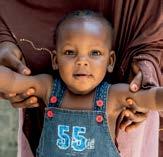
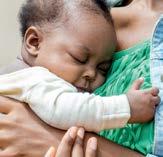
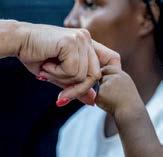

76% of the population uses improved drinking water sources
57.5% uses improved sanitation facilities 7 but only
1 in 10 children don’t make it to their 5th birthday; a third of underfive deaths are in the first 28 days of life 10
[NEONATAL PERIOD] birth registration for children under 5 , countrywide coverage 9 62%
2.2 million children are unvaccinated 11 only 56.6% are fully immunized against DTP
[DTP = DIPHTHERIA, TETANUS AND PERTUSSIS]
33% are stunted, with the highest rate (48%) found in the North West 12 of children under 5
4.5 million children are affected Conflicts and displacement:
2 million internally displaced and 1 million displaced by violence in Benue State
Nigeria is ranked the 2nd highest country in the world for climate risks to children13
Some 1.2 million children under 5 were treated for diarrhoea and almost 300,000 for pneumonia through UNICEF-supported community health service delivery across 10 states.
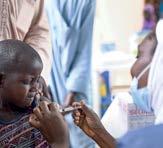
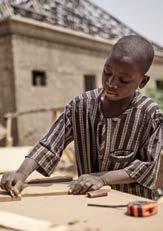
Two million more children, including over 200,000 out-of-school children, accessed formal and non-formal education and learning in 13 states, through increased engagement of local school communities and innovation.
The introduction of human papillomavirus (HPV) vaccines benefited 4.6 million girls in 15 states through UNICEF vaccine procurement.
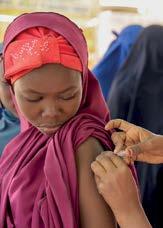
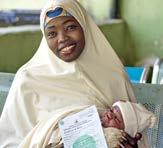
Over 11 million under-five births were registered through the UNICEF-supported digital civil registration and vital statistics (CRVS) system.
31 million children were supplemented with vitamin A and dewormed through two rounds of the nationwide Maternal, Newborn and Child Health Week campaign.

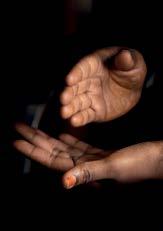
Six million people were mobilized to fight female genital mutilation through the Movement for Good initiative, which aims to end the practice in five states.
The second highest number of users in the world – nearly 780,000 –were registered on the digital learning platform, Nigeria Learning Passport, through strong public–private partnerships facilitated by UNICEF.
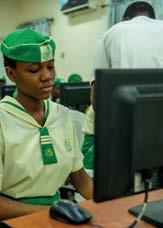
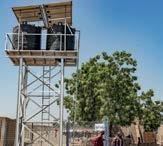
Four million people, including 790,000 in humanitarian contexts, were reached with clean water through the repair, upgrading or construction of water facilities and development of sustainable operation and maintenance models.
Four million people were reached with access to basic sanitation services through the Clean Nigeria Campaign and 2.6 million people in 4,000 communities and 17 local government areas were certified as open-defecation-free.

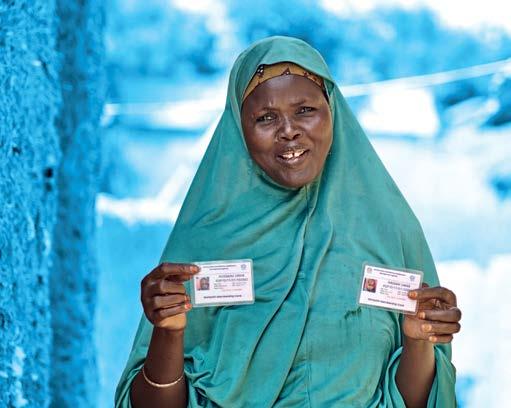
The National Social Registry’s coverage doubled from 15 per cent to 30 per cent through UNICEF social policy advocacy.
Around 11.2 million pentavalent and over 20 million tetanus and diphtheria vaccines were procured by UNICEF for a vaccination campaign that focused on unvaccinated children in response to a diphtheria outbreak in the North West and North East.
One million severely malnourished children were treated with life-saving ready-to-use therapeutic food, supplied by UNICEF.
Nearly 300,000 children and women were reached with UNICEF-supported community-based mental health and psychosocial support.
Over 625,000 children accessed UNICEF-supported formal and non-formal basic education, including early learning.
A total of 10,069 households were reached with UNICEF-funded humanitarian cash transfers.
The first emergency preparedness simulation was conducted with 30 government representatives, including 5 UNICEF-supported zonal contingency plans for the North West, North Central, South West, South South and South East regions. These contingency plans were informed by the 2022 risk analysis.
An early recovery response to 185,000 people affected by the 2022 floods was concluded, via the provision of safe water, rehabilitation of 13 health centres and protection support for children.
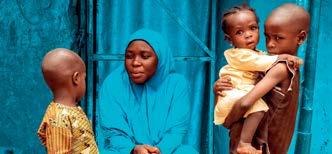
Start of the new Country Programme 2023–2027 between the Government of Nigeria and UNICEF.
Launch of the Youth Manifesto on Climate Change, shaped by contributions from students, activists, and Nigerian youths, calling for increased action and funding for climate change in the education sector.
Launch of the joint UNICEF and Nigerian Economic Summit Group partnership on building platforms for accelerating child rights and development in Nigeria, synergizing government and corporate efforts towards child rights and development in Nigeria.
The new administration debuted the President's Renewed Hope Agenda, emphasizing children's investment as a priority for national development in the 2024 appropriations bill at the National Assembly.
March
Launch of the Primary Health Care Leadership Challenge, incentivizing Nigerian governors to enhance primary health care by rewarding innovation and fostering mutual learning.
Standard Operating Procedures for Handling Cases of Children in Conflict with the Law, Child Victims and Witnesses approved and adopted by the government, leading to the diversion of 718 minors establishing child-friendly justice systems in five states.
Stakeholders at the National Conference on the Learning Crisis in Nigeria reached a consensus on evidenceinformed solutions to the learning crisis, which are now encapsulated in the national Framework of Action.
First round of Maternal, Newborn and Child Health Week campaign completed, supporting Vitamin A supplementation, deworming and iron supplementation for pregnant women.
Social policy dialogue took place, shaping a clear plan to strengthen the national social registry, making it the sole database for poverty alleviation reduction interventions.
The Nigeria Learning Passport reached half a million users, providing teachers and parents with support and learning continuity for children.
2023: A year of action for children and adolescents 9
Launch of the Climate Landscape Analysis for Children, outlining key climate threats to children and detailing UNICEF’s adaptation actions in Nigeria for 2023–2027.
Launch of the electronic Civil Registration and Vital Statistics System (e-CRVS) by President Bola Ahmed Tinubu, which registered the births of 11 million children in 2023.
UNICEF signed the Health Sector-Wide Approach, unifying partner efforts to enhance Nigerian health outcomes.
In Nigeria, UNICEF partnered strategically with various stakeholders, for example, joining forces with Gavi, the Vaccine Alliance and local health authorities across eight states to recruit medical health-care workers and help reduce the number of unvaccinated children.
Key to UNICEF’s strategy were social and behaviour change initiatives that promote positive behaviours. In 2023, integrating human-centred design with U-Report polling was particularly effective in stimulating routine vaccination demand, introducing the HPV vaccine and addressing a diphtheria outbreak.
To improve health care, nutrition and registration services for children in hard-to-reach areas, UNICEF supported a localized rapid response mechanism in conflict-affected Marte Local Government Area in the North East, which was critical for screening malnutrition in children and providing WASH facilities to isolated families.
UNICEF also prioritized convergent programming, such as rolling out e-CRVS in 23 states and integrating it with health services, to widen the reach of birth registration.
Additionally, investing in adolescent girl empowerment, including comprehensive life skills education and HPV vaccinations, continued to be an important strategy to break poverty and gender-based disparities.
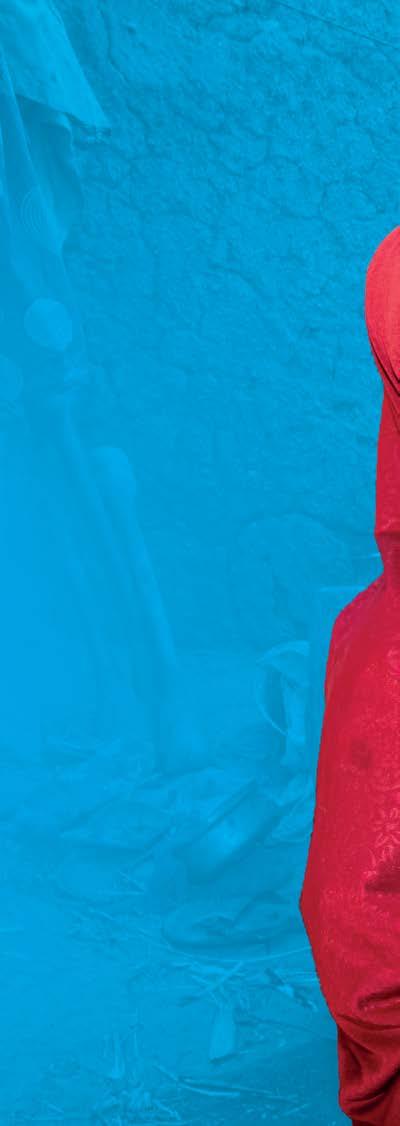
Robust data collection, exemplified by studies on child marriage costs, the impact of climate change on children, and the economic effects of conflict, guided policymaking for child welfare and assisted UNICEF and its partners to develop targeted interventions.
UNICEF’s communications and advocacy strategies helped to amplify the voices of children and young people. The year 2023 saw a significant increase in digital engagement, with a 116 per cent boost in website views (to 1.7 million) and social media interactions doubling to almost 26 million.
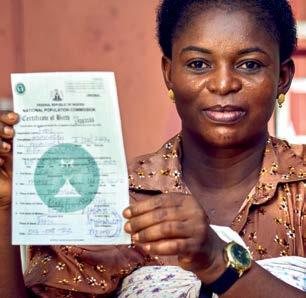
Key to UNICEF’s strategy are social and behaviour change initiatives that promote positive behaviours.

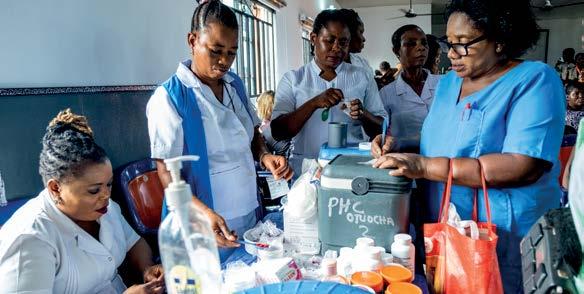
Tessy Job, 27, expressed profound relief and thankfulness when her premature baby was saved by the use of an oxygen concentrator, saying, “I would have lost my baby if there was no oxygen.” Her experience reflects a larger reality at the Barau Dikko Teaching Hospital in Kaduna, northern Nigeria, where every year, between 1,000 and 1,500 newborn babies require critical care, with oxygen deprivation posing a serious risk of lifelong developmental delays and disabilities. Over 70 per cent of these infants need oxygen to survive at some point during their hospital stay.
To reach more mothers like Tessy with life-saving care for their babies, UNICEF helped establish nine oxygen plants and six neonatal units across six states. These facilities are poised to assist 264,600 children under the age of 5 and about 5,000 newborns yearly. Policy enhancements and the establishment of key guidelines on newborn care, HIV disclosure and infection prevention during medical procedures promise to further improve the quality of child health care.
Health-care coverage was expanded, with nearly 1,500 health workers trained for pneumonia and hypoxemia management and the capacity of 8,500 individuals strengthened across 10 states, reaching over 1.6 million women with skilled birth attendance, and treating diarrhoea in nearly 1.2 million children and pneumonia in almost 300,000 children under 5.

Furthermore, strategic engagement with governors and deputy governors helped train nearly 3,900 midwives, nurses and other health workers and enrolled over 70,000 individuals for health insurance, mitigating out-of-pocket costs for the vulnerable.
Youth engagement was also significant, with 1.8 million adolescents accessing health information and services, and actively participating in health conferences and vaccination campaigns.
Vaccination rates rose, with 72 per cent of adults fully vaccinated against COVID-19; there was a 4 per cent increase in pentavalent-1 vaccine coverage and a 7 per cent rise for pentavalent-3 year-on-year. A reduction in immunization coverage disparity was evident, with more states reaching over 80 per cent coverage. The diphtheria vaccination drive helped immunize 7.8 million children, and poliovirus cases saw a 23 per cent decrease, with polio vaccination campaigns reaching over 26 million children. UNICEF’s initiatives also led to the successful rollout of the HPV vaccine for 4.6 million girls and improved nutrition investment.
In nutrition, over 95 per cent of therapeutic food procured by UNICEF was locally manufactured, reducing costs. During UNICEF-supported Maternal Newborn and Child Health Week campaigns, 31 million children were supplemented with vitamin A, 8.8 million children were dewormed, 4.8 million pregnant women were supplemented with iron, and nutrition counselling was provided to 1.3 million new or expecting mothers.
UNICEF’s pilot programme for humanitarian cash transfers in the North East and North West supported 6,609 caretakers, aimed at preventing a relapse in severe malnutrition in children under their care. This intervention is part of a broader effort that successfully treated an unprecedented 850,000 severely wasted children aged 6 months–5 years, the highest number reached over the past five years.
Oxygen is a crucial medical gas used to treat respiratory illnesses and support health services like emergency obstetric care, surgery and anaesthesia. In Nigeria, over 120,000 children die each year due to hypoxemia.
UNICEF and partners are working together to improve oxygen supply in Nigerian hospitals. They have introduced an app to plan oxygen systems and have deployed the ‘oxygen-plant-in-a-box’ initiative in nine hospitals to produce large volumes of
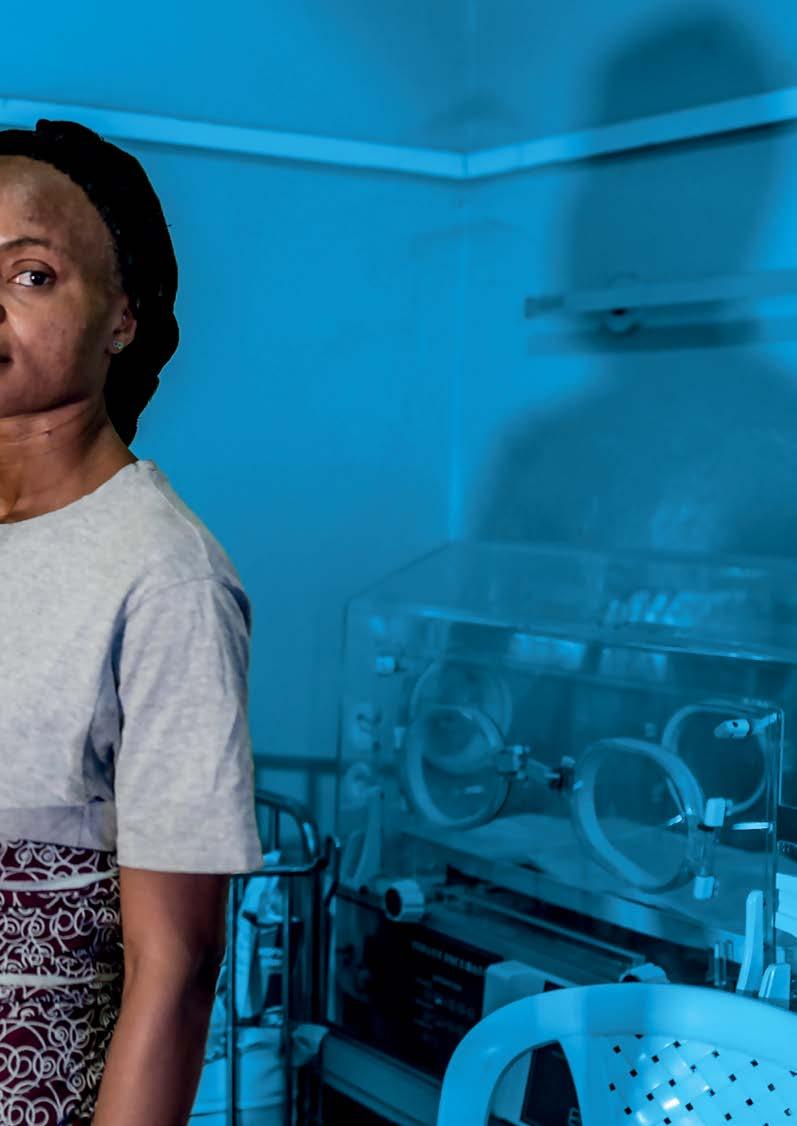
medical oxygen, including nine pressure swing adsorption oxygen plants and six newborn units in six states.
UNICEF’s commitment to developing sustainable energy solutions and climateresponsive communities has also yielded a first-in-the-world engineering feat: an affordable solar microgrid system with battery storage for uninterrupted oxygen production. Two hospitals in Nigeria have tested this system and UNICEF has shared the design with other hospitals.
Bolade Ayomide, a 14-year-old student at Government Senior College Agege, Lagos, is passionate about the arts and wants to become a lawyer. She struggled with biology and lacked confidence in her abilities to keep up with her competitive peers. With the Nigeria Learning Passport, her learning experience improved significantly. The online learning platform offered engaging, interactive and personalized learning materials, helping her improve her grades and learn how to design by using the Microsoft app on the platform, a skill she now uses to earn money by designing birthday posters for her friends and family members.
Through innovative interventions such as the Nigeria Learning Passport, UNICEF and its partners are working to improve access to quality education for marginalized children. In 2023, nearly 780,000 children, parents and teachers engaged with the digital Nigeria Learning Passport platform, the secondhighest number of registered users in the world.
The Government of Nigeria enhanced access to education during the year, integrating UNICEF’s out-of-school framework into a national strategy. With UNICEF’s support, a national strategy was also developed to improve secondary education retention and completion, focusing on girls, while the National Council of Education adopted a policy to support pregnant and married adolescent girls to return to school.

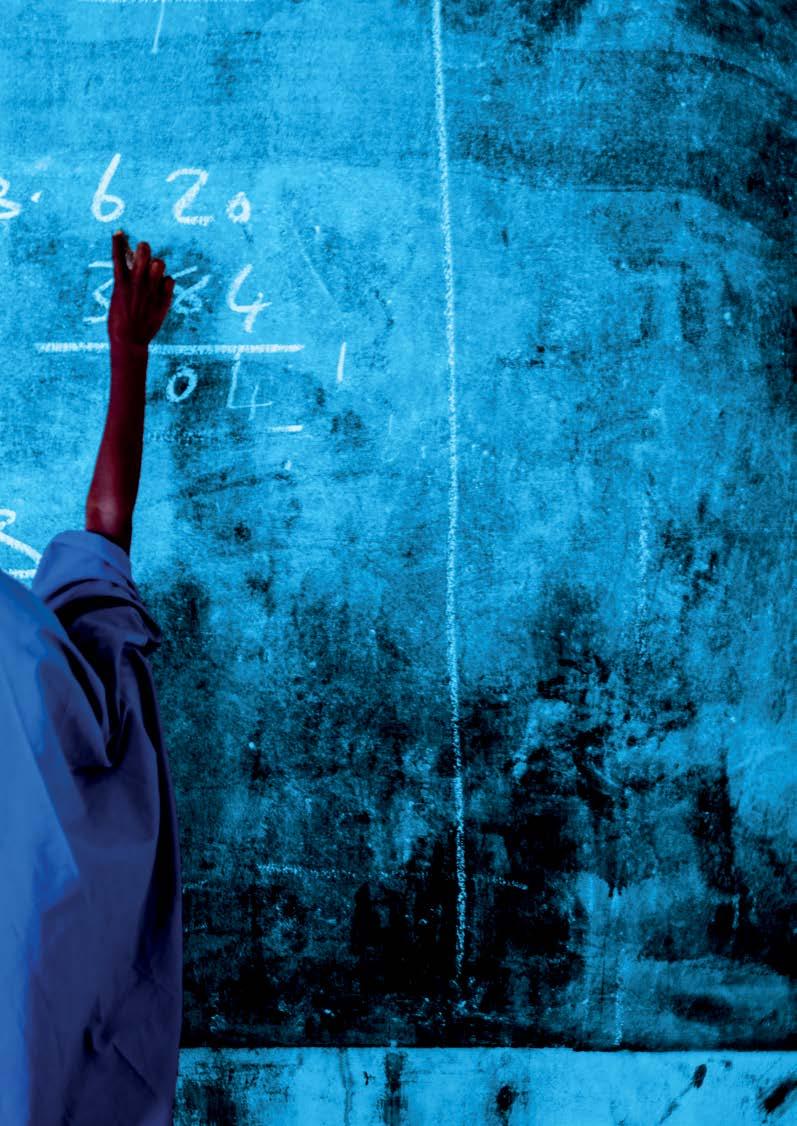
In addition, UNICEF helped the government revise the National Early Childhood Care Development and Education Policy and standards to improve pre-primary education access.
The year saw UNICEF championing skills development, climate change education standards and youth engagement in Nigeria. A national skills framework was developed to define the skills needed for success in education, work and life. As a result, over 305,000 children improved their skills for better learning outcomes.
Climate change education standards were developed, setting a new benchmark for the education curriculum. Additionally, UNICEF supported the Youth Manifesto on Action on Climate Change and Education in Nigeria, based on input from thousands of adolescents and young people.
UNICEF continued to support access to formal and non-formal learning, including early childhood education, for over 600,000 children affected by emergencies.

In 2023, nearly 780,000 children, parents and teachers engaged with the digital Nigeria Learning Passport platform.
Rhoda Egbe, a 37-year-old mother of five, holds her youngest child close, as she joins a crowd at the Federal Medical Centre National Population Commission registration centre in Makurdi. Determination etched on her face, she shares a story echoing the struggles of many in Nigeria: “My parents did not register me at birth because they did not understand the importance.” She adds, sombrely, “Though my mother remembers the day I was born, there is no certificate to show for it.” Her voice underscores a firm resolve – no child of hers would ever have to feel as invisible.
Community engagement also played a key role in strengthening child protection services. With UNICEF support, nearly 1,300 local child protection structures were strengthened to deliver child protection services, reaching children and families directly.
Addressing violence, UNICEF reached around 120,000 affected children with comprehensive services encompassing health, welfare and justice. Through concerted efforts in six states, 718 young girls and boys in conflict with the law were steered away from detention, embracing rehabilitation instead. Five additional states introduced child-friendly justice systems, providing a more compassionate and rehabilitative approach for young offenders.
Rhoda’s experience underscores the importance of UNICEF’s strategy to enhance the legal identity of children through accelerated birth registration. Working with government partners, UNICEF’s efforts, which included implementing e-CRVS in 23 states, helped to register over 11 million children under the age of 5. e-CRVS is set to overhaul the registration of vital events, transitioning Nigeria from a paper-based system to an internationally aligned digital framework.
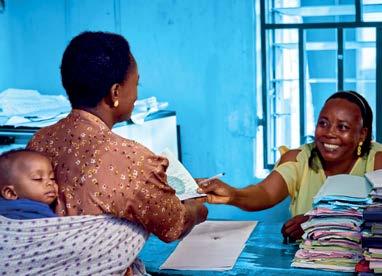
Nationwide, UNICEF set the stage for standardized child welfare through validated guidelines on alternative care for children in humanitarian action, harmonized tools and institutional support such as the establishment of the Council for Social Work. Significantly, reintegration efforts in three states saw 3,900 children associated with armed groups transition back into society, with 141 released from military custody.
UNICEF’s policy influence in child protection remained a priority. Contributions to the Nigeria Universal Periodic Review 2023 directly addressed child rights policies. Social mobilization against female genital mutilation grew, with 6.2 million participants advocating for eradication in five regions. Close to 17,000 adolescent girls received life-skills training, including comprehensive sexuality education, equipping them to advocate for change and challenge harmful practices and gender inequality.
In humanitarian contexts, safeguarding the most vulnerable children from harm was key. UNICEF ensured that children had safe channels to report incidents of sexual exploitation and abuse by humanitarian actors, thereby prioritizing timely and appropriate support for 250,000 children.
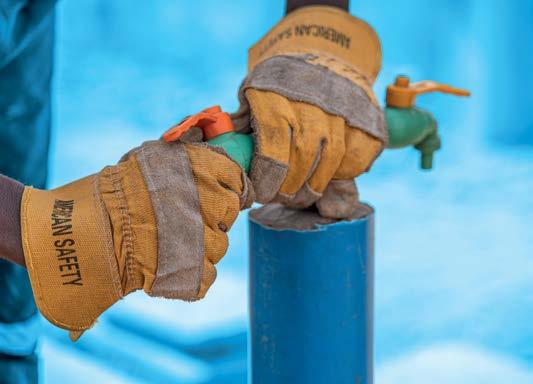
Two years ago, in the quiet Shuni community in Sokoto in Nigeria’s North West, Ridwan Shuaibu was struggling as a bike rider and plumber, barely making enough to care for his parents. Despite his hardships, Ridwan had a passion for a technical trade and showed skill in plumbing. This led to his training as a local area mechanic where he learned the importance of water supply maintenance for good health. “I believe that this work I am doing now is the right path to becoming a university-trained mechanical engineer. It will help me make a better impact on my community.”
99,326 displaced people receiving hygiene kits and menstrual hygiene kits.
Introducing the 5-STAR approach in schools and health centres across Kano, Katsina and Jigawa states, UNICEF helped install sex-segregated and climateresilient WASH facilities in over 100 schools and 71 primary health centres, reaching 25,000 school children and 9,000 patients. In addition, 58,000 adolescents, mainly girls, benefited from menstrual health and hygiene messages in 486 schools.
UNICEF’s continued support of the Clean Nigeria Campaign led to 4 million people attaining basic sanitation, with 2.6 million individuals in communities and local government areas achieving open-defecationfree status. There was significant engagement with toilet construction companies, resulting in the construction of over 33,000 toilets.
UNICEF is helping train local mechanics like Ridwan to ensure the sustainability of WASH facilities in Nigeria. In 2023, with UNICEF support, 936 water supply systems were repaired or constructed and over 3,000 maintenance and operational models were established, providing 4 million people with better access to safe drinking water. These included 790,000 people who received emergency WASH assistance in humanitarian situations.
In conflict-affected north-eastern Nigeria, approximately 600,000 people gained access to safe water through UNICEF’s initiatives, with an additional
The Climate Landscape Analysis for Children report was launched on World Children’s Day on 20 November, underscoring the urgency for action to protect children’s rights in response to climate challenges. Targeted emergency assistance was provided to 185,000 people affected by the 2022 floods, including cash transfers to 3,381 flood-affected households in Bayelsa State in southern Nigeria.
As a provider of last resort in the emergency WASH sector, UNICEF helped maintain latrines in camps for internally displaced people, backed the construction of climate-resilience water supply systems to eliminate community reliance on water trucking and supported cholera preparedness plans in hotspot areas.
In 2021, the Oyedokun family home in Kaduna South Local Government Area was severely damaged by floods, leading to significant distress and negatively impacting the mental health of the oldest daughter, Anike.
Facing the upcoming rainy season of 2022 without the means to relocate, the family was concerned about potential repeat flooding. However, the Oyedokuns, along with a neighbour, benefited from a cash transfer funded by the Directorate-General for European Civil Protection and Humanitarian Aid Operations, which they used to build a stone wall that successfully prevented floodwaters from entering their homes that year.
“We don’t have money to move from this area to higher ground yet, but this stone wall has really been helpful.”
In Nigeria, where poverty is high, cash support programmes that assist vulnerable families like the Oyedokuns are crucial, as they provide a safety net in times of crisis. In 2023, with UNICEF support, the National Social Registry coverage doubled, from 15 per cent of Nigerian children in 2022 to 30 per cent in 2023, enhancing the reach of social protection efforts.
In parallel, UNICEF’s partnership with Nigeria’s National Bureau of Statistics brought about enhancements in the ways child poverty is monitored and documented, enabling more informed responses and strategic planning.

Another noteworthy development was the recalibration of Nigeria’s public finance strategies. Sustained UNICEF engagement and innovative technical assistance led to prioritizing human capital development in Nigeria’s 2024–2026 MediumTerm Expenditure Framework. The share of public spending exceeded 2023 targets by 0.9 per cent in education, 0.8 per cent in health and 0.17 per cent in social protection, reflecting an increased commitment to investing in the critical sectors shaping children’s futures.
UNICEF also supported the development of policy instruments to refine fiscal policies. One such innovation is a digital analyser aimed at fine-tuning budgetary approaches to tackle child deprivation effectively. Additionally, a study focusing on the economic impact of conflict in North East Nigeria was launched and will inform future interventions and policy design.
Generous donor contributions were key to the success of UNICEF’s programmes, including those for emergency responses, with donors being instrumental in providing flexible funding support. On the ground, families and children bearing the brunt of emergencies were extended a lifeline through humanitarian cash transfers, including nutritionrelated humanitarian cash transfers.
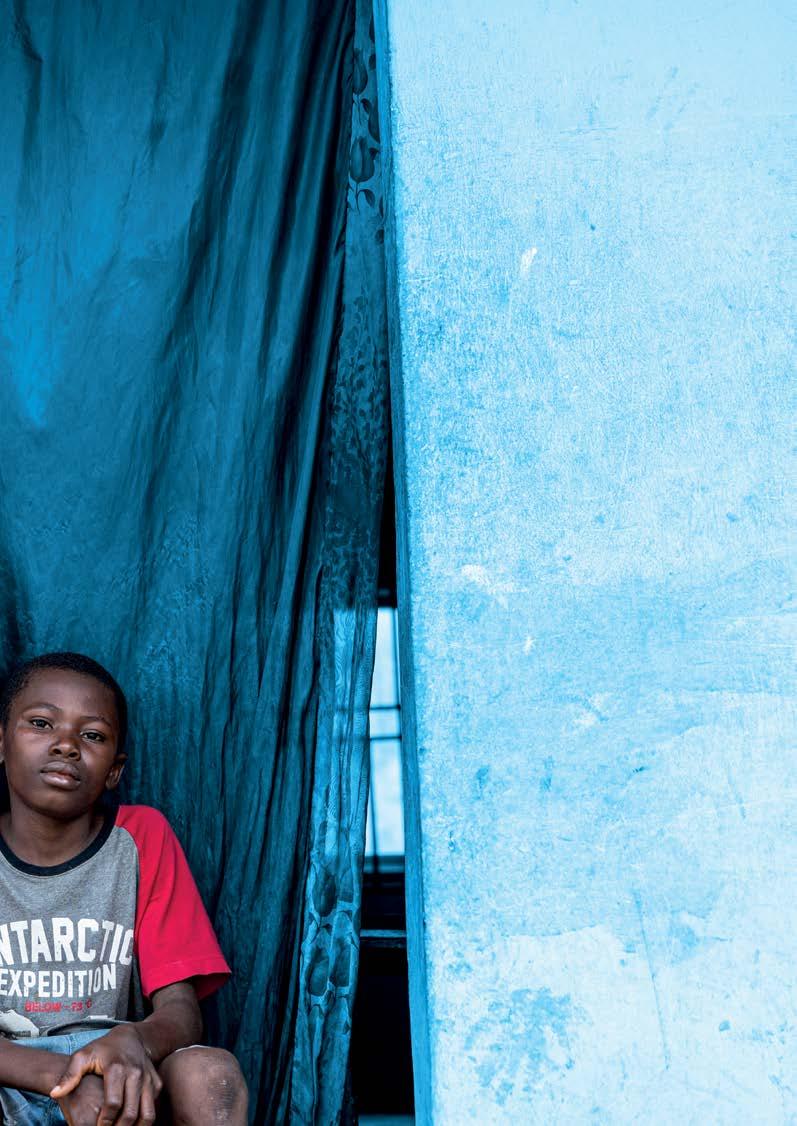
In 2023, with UNICEF support, the National Social Registry coverage doubled, from 15 per cent of Nigerian children in 2022 to 30 per cent in 2023.
We thank donors for their generous contributions in 2023.
Governments
France
Sida – Sweden
United Kingdom
US$51,246,868
United States Agency for International Development
United States Bureau for Humanitarian Assistance
United States of America
Switzerland
European Commission
Directorate-General for European Civil Protection and Humanitarian Aid Operations
National committees
French Committee for UNICEF
Netherlands Committee for UNICEF
United Kingdom Committee for UNICEF
United States Fund for UNICEF
German Committee for UNICEF
Switzerland Committee for UNICEF
US$12,472,905
Global programme partnerships US$38,300,010
Gavi, the Vaccine Alliance
The Global Fund to Fight Aids
Nutrition International Education Cannot Wait Fund
United
United Nations Office for the Coordination of Humanitarian Affairs
International Organization for Migration
United Nations Multi-Partner Trust
Regional UNICEF allocations (Thematic and Non-Thematic )
Note: Allocations to social behaviour change, gender, adolescents and emergency programmes are included in each sectoral programme.
Partners: Unilever; IHS Towers; Airtel Nigeria; Cisco; Microsoft; MTN Foundation
* Shared value partnerships are innovative national partnerships that leverage the expertise, funds and other resources of all partners to help achieve results for children in Nigeria.
1. United Nations Children’s Fund data, Nigeria –Demographics, Health and Infant Mortality.
2. World Food Programme data, <https://www.wfp. org/countries/nigeria#:~:text=It%20is%20the%20 tenth%2Dlargest,live%20below%20the%20poverty%20 line>.
3. United Nations Children’s Fund, Multidimensional Child Poverty in Nigeria: Multiple Overlapping Deprivation Analysis (MODA), 2021.
4. Ibid.
5. Ibid.
6. National Bureau of Statistics and United Nations Children’s Fund, Nigeria – Multiple Indicator Cluster Survey (MICS) and National Immunization Coverage Survey (NICS): Survey Findings Report , NBS and UNICEF, Abuja, Nigeria, August 2022.
Cover © UNICEF/Damilola Onafuwa
Inside cover © UNICEF/Damilola Onafuwa
7. Ibid.
8. Ibid.
9. National Population Commission and United Nations Children’s Fund, Civil Registration and Vital Statistics (CRVS) Sectoral Report 2023. Restrictions have been applied to the online link for data protection.
10. Ibid.
11. Ibid.
12. Federal Government of Nigeria and the International Institute of Tropical Agriculture, National Food Consumption and Micronutrient Survey 2021: Preliminary Report, FGN and IITA, Abuja and Ibadan, Nigeria, 2022.
13. United Nations Children’s Fund, The Climate Crisis is a Child Rights Crisis, UNICEF, New York, 2021.
1 (left to right) © UNICEF/Ibrahim Tiymiyu; © UNICEF/Damilola Onafuwa; © UNICEF/Damilola Onafuwa; © UNICEF/ Damilola Onafuwa
2 © UNICEF/Damilola Onafuwa
5 (left to right) © UNICEF/Damilola Onafuwa; © UNICEF/Damilola Onafuwa; © UNICEF/Damilola Onafuwa; © UNICEF/ Chikki Media
6 (top, left to right) © UNICEF/Abraham Achirga Terngu; © UNICEF; © UNICEF/Damilola Onafuwa; © UNICEF/Ibrahim Tiamiyu; (bottom, left to right) © UNICEF/Dawali David; © UNICEF/David Boman; © UNICEF/Damilola Onafuwa; © UNICEF/Ahmad Mari
7 (top, left) © UNICEF/Apochi Owoicho; (top right) © UNICEF/David Boman; (bottom) © UNICEF/ Chikki Media
10 (main photo) © UNICEF; (inset) © UNICEF/Peter Adzape
11 © UNICEF/Damilola Onafuwa
12 © UNICEF/Light Oriye
14 © UNICEF/Owoicho
15 © UNICEF/Ibrahim Tiyamiu
16 © UNICEF
17 © UNICEF/Apochi Owoicho
18 © UNICEF/Apochi Owoicho
United Nations Children’s Fund
United Nations House
Plot 617/618, Diplomatic Zone Central Area District
P.M.B 2851, Garki Abuja, Nigeria
Tel: +234 (0) 9-4616100
Web address: http://www.unicef.org/nigeria
@UNICEFNigeria
@unicef_nigeria
@unicef_nigeria
UNICEFNigeria